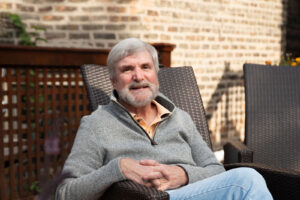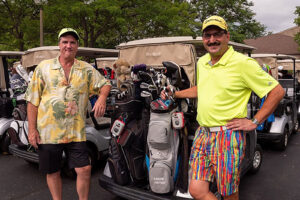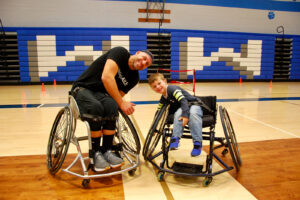Imagine if you could train your brain like a muscle. If, through repeated strength training, you could mitigate any fear when you hear words like “cancer” or “chemotherapy.” It might sound impossible, but this is just one use case for neuroplasticity — a wellness tool growing in popularity that involves training our brain to form new ways of thinking.
As we dive into a new year, we encounter well-intentioned reminders of mindfulness and positive thinking. But behind all of these tools, there is the brain itself; that magnificent, complex machine perched atop our spines that can do all of that, and then some. Years of research in neurology have uncovered the reality that our brains are capable of adapting to new information and action at a tremendous capacity.
As we age, we can continue adapting and strengthening our brain even more, creating new pathways for thinking through this organ’s “plastic” nature. The word itself is a clue: “neuro,” refers to the neurons, or nerve cells, inside our brain, and “plasticity” refers to its malleability. So, what is this phenomenon and how can it be used?
“Neuroplasticity is creating new synapses in the brain or strengthening ones that can be weak,” says Professor Selena Bartlett. “A synapse is that minimal unit of neural networks in the brain that can be trained. So, neuroplasticity, meaning the brain can change with training and effort, starts with our own belief system first. What do we believe about ourselves and what do we want to create in our life?”
Bartlett is a neuroscientist and professor of neurology at Queensland University of Technology in Brisbane, Australia. Her work has brought this wellness tool to a wide audience within and outside the medical community. She first became interested in the idea of neuroplasticity more than a decade ago, while running a lab at the University of California, San Francisco (UCSF). “Up until that point, most of us had been teaching everyone that the brain couldn’t be changed after the age of 25,” she says.
Bartlett has been studying the brain since 1989, but in the last two decades, major technological advancements, including functional MRIs and neuroimaging, led to a breakthrough. After years of research at UCSF, “it became clear that our brains can change across our lifespan, no matter what the situation is,” she says.
Most notably, Bartlett’s research shows the brain can help the body recover from traumatic illness, both mentally and physically. Neurology has revealed that our health isn’t just a game of genetic-roulette, but rather a mindset and outcome we can continuously nurture.
“To heal and to evolve are intimately linked,” says Rudolph Tanzi, PhD, in his book “Super Brain.” “Your brain is remodeling itself right now.” Tanzi is a professor of Neurology at Harvard University and a renowned thought leader in neuroscience. In his seminal book on the brain, he writes, “Neuroplasticity is better than mind over matter. It’s mind turning into matter as your thoughts create new neural growth.”
Tanzi and Bartlett’s research shows that through continual learning and repetitive action over the course of weeks and months, our brains form these new synapses, or neural networks, to communicate to the rest of our body that we are not stuck, but there are new ways out. As we actively form new neural pathways, the old ones fade. This may sound simple enough, but it takes work.
“There is no neuroplasticity without training and effort and practice,” Bartlett explains. “It’s not a 10-week fix either. The older we get, the harder it gets to maintain it for long enough to make a new habit.” Bartlett says the process can begin with small steps instead of a dramatic shift in lifestyle, as your synapses will have a more difficult time adjusting to these big changes.
Because everyone in the cancer community is affected by this disease in myriad ways, Bartlett has a few simple strategies to help anyone tap into neuroplasticity. These strategies are particularly useful for situations as stressful as a cancer diagnosis and are easy enough to begin right away.
“You can start right now by opening your eyes, looking out a window, or even in a room, and taking in a wide view, rather than a narrow view, around you,” Bartlett says. “Especially right now, we have our vision narrowed down [by] looking at our phones, computers and devices. And that ends up stressing out the brain, because the brain’s not used to it — it’s a whole new thing in evolution.” Bartlett says this is called taking in a “panoramic view,” and that it does wonders for our brain.
Another pivotal strategy for brain health is deepening your relationships. That includes finding a “tribe” — friends, family and, if available, a community who can relate to your circumstances and provide support.
“That would be my biggest suggestion,” says Bartlett. “The brain, over millions of years of evolution, has been designed for social cognition. When you find your tribe, that gives you the oxytocin and supporting hormones you need to say, ‘I’m not alone, and there’s a lot of people in my situation.’” According to Bartlett, finding your community allows our brain to chemically calm down.
“That’s neuroplasticity at work. And joining a group of people you don’t know can be very anxiety-provoking, but once you take the leap, you’re tapping into neuroplasticity,” she says. “You’re learning a new language around survivorship.”
A key tactic Bartlett also recommends is a morning routine. When you wake up in the morning, what’s the first thing you do? Anticipate your to-do list? Scroll through social media? Google a symptom?
That’s our natural vice,. Instead of Dr. Google, look out the window, take a panoramic view and think of three things you’re grateful for. From a neuroscience perspective, that taps into the autonomic nervous system to turn down your stress reactions. If you can’t do it when you first wake up in the morning, you can do it throughout the day. You’re tapping into the brain’s capacity for handling stress.
Professor Selena Bartlett
Laura Rubin is a fellow cancer survivor, creative coach and founder of AllSwell Creative, a journaling brand and lifestyle community focused on empowering others through creativity. Journaling is Rubin’s expertise, and she believes its neurological benefits are endless. She leads workshops around the country teaching the benefits of daily journaling — one session is focused specifically on neuroplasticity.

One of the greatest aspects about neuroplasticity, Rubin says, is how accessible it is. She cites simple acts such as reading, exploring a new place, dancing and learning something new as some key ways to practice this mental exercise. “You don’t need a fancy spa treatment, you don’t need a co-pay, you don’t need a specialist,” Rubin says. “[It’s] those things that we can do on a daily basis that foster an overall sense of joy, well-being, satisfaction — the list is long.”
Rubin was 31 when she was diagnosed with stage II HER2-positive breast cancer. Throughout her years into recovery, she began what she calls “a concerted study around the science of happiness.”
“Brain health is hugely important for all aspects of life, so that’s one of the reasons I personally got interested in the field,” she says. “There are ways that we can actually contribute to our base level of joy on a day-to-day basis. It isn’t just about external factors.” Neuroplasticity is a tool that she hopes to continue sharing with others.
Whether you are mid-diagnosis, post-recovery or taking care of someone with cancer, there’s tremendous power within the brain just waiting to be tapped. The best part? It can start today. By exploring these strategies and more, we can form the foundation for a strong, healthy brain; one that is prepared to manage fears and anxieties with ease. So, grab a pen, take a look outside and remind yourself that you’ve got this. It’s all science.







